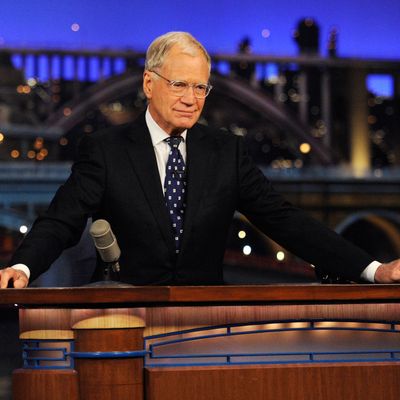
To the end, Letterman was Letterman.
Throughout the final broadcast of The Late Show, David Letterman commemorated 33 years of subverting late-night talk-show traditions by pushing against sentimentality. In the run-up to his grand finale, the host had been his usual self, uncomfortable with messy displays of emotion, exaggerated and sincere. He accepted compliments and testimonials from the likes of Julia Roberts, Bill Murray, Tom Hanks, and longtime regular Rupert Jee (of the Hello Deli), and standing ovations from his studio audience graciously but impatiently, even cautioning that if there was too much of that sort of thing, weÔÇÖd all live to regret it. ÔÇ£See what happens?ÔÇØ he told the audience at last nightÔÇÖs taping, which greeted his introduction with an extended standing O. ÔÇ£We donÔÇÖt have time for the giving-gifts-to-the-audience segment.ÔÇØ
The broadcast opened with a clip of President Gerald Ford at his 1975 inauguration declaring, ÔÇ£Our long national nightmare is over,ÔÇØ then cut to all living presidents (sans Jimmy Carter)┬á┬ásaying the same thing of LettermanÔÇÖs sign-off. The biggest laugh came during his opening monologue admission that ÔÇ£itÔÇÖs beginning to look like IÔÇÖm not gonna get The Tonight Show.ÔÇØ
As for the ÔÇ£TV show as loving familyÔÇØ conceit? Letterman would have none of it. He told the audience that┬áphysicist Stephen Hawking had crunched the numbers and determined that his 6,028 shows since debuting on NBC in 1982 contained ÔÇ£eight minutes of laughter,ÔÇØ showed an alleged clip of himself saying good-bye to his staff via a sparkly hologram, like a Star Wars villain, and aborted what promised to be a self-aggrandizing story about a sweet conversation with a sound guy named Dutch by admitting ÔÇ£that may not be his name, IÔÇÖve been calling him that for the last 20 years.ÔÇØ
He showed clips from other TV stars and programs whose messages all boiled down to, ÔÇ£DonÔÇÖt let the door hit your ass on the way out, Dave.ÔÇØ Wheel of Fortune spelled out ÔÇ£Good riddance to David Letterman,ÔÇØ and a personalized good-bye clip from The Simpsons saw Homer laughing uproariously at the sight of Dave tossing a note card and breaking the nonexistent window behind his desk (a joke that continued to be funny only because Letterman kept doing for it years after it ceased to be funny, if that makes sense, and if it doesnÔÇÖt, itÔÇÖs because Letterman was never your thing, probably). Letterman introduced an all-celebrities Top Ten List of ÔÇ£ÔÇ£Things IÔÇÖve Always Wanted to Say to DaveÔÇØ by thanking all his guests for ÔÇ£their time, their talents, and their generosity.ÔÇØ The ensuing lineup included Alec Baldwin confessing, ÔÇ£Of all the talk shows, yours is the one most geographically convenient to my house,ÔÇØ Chris Rock declaring, ÔÇ£IÔÇÖm just glad your show is being given to another white guyÔÇØ (Stephen Colbert, in case you hadnÔÇÖt heard), and Tina Fey thanking Letterman for proving that men could be funny.
Here and there, bits of showbiz ÔÇ£warmthÔÇØ peeked through, but so sneakily they nearly qualified as subtext. Announcer Alan Kalter described Letterman in his introduction as ÔÇ£a boy from small-town Indiana,ÔÇØ which subtly reminded us of what a long, strange, surprising journey the comedian had taken. Letterman screened a generous montage of himself interacting with kids (counterintuitively, his grumpiness and prankish humor always drew much cuter reactions from children than other hostsÔÇÖ fawning attentions) and ended with a child flat-out telling him he wasnÔÇÖt funny. Bandleader Paul Shaffer summed the whole thing up in a comment during the showÔÇÖs at-least-three-quarters-mocking ÔÇ£Day in the Life of LettermanÔÇØ video, saying that throughout the final run of the show, people approached the host backstage and said, ÔÇ£ÔÇÿDave, I know you hate this,ÔÇÖ and then they go on to do the thing that he hates.ÔÇØ
LettermanÔÇÖs shtick eventually grew beyond contrarian attitudes and mainstream-unfriendly conceptual humor and became something slightly more in tune with a traditional broadcast sometime after 1993, when he jumped from NBC to CBS in the aftermath of Jay Leno getting The Tonight Show and became, by definition, an Establishment figure. But he never entirely lost touch with that oppositional sensibility, and a big part of that was rooted in reminding the audience, regularly and in all sorts of ways, that late nightÔÇÖs illusion of intimacy was exactly that. The most striking moment in the farewell ÔÇö┬áfor this viewer anyway ÔÇö┬áwas a brief clip of the late Andy Kaufman, LettermanÔÇÖs friend and one of his comic heroes, sitting on the couch during LettermanÔÇÖs NBC years, with his trademark introverted-terrified blank expression, pale and greasy and wild-haired, with a crusty patch of snot under one nostril. It was with Kaufman, perhaps, that LettermanÔÇÖs sympathies always lay, even when he got bigger guests and started wearing suits that cost more than everything Kaufman ever owned.
ÔÇ£WeÔÇÖve done over 6,000 shows,ÔÇØ Letterman said during his final sign-off. ÔÇ£I was here for most of them, and I can tell you, a pretty high percentage of those shows absolutely sucked.ÔÇØ His fans would beg to differ, but Letterman would really rather not hear it. He said he was grateful for all the kind words but would rather that everyone ÔÇ£save a little for my funeral.ÔÇØ


